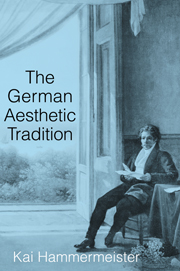5 - Hegel
Published online by Cambridge University Press: 14 January 2010
Summary
With Hegel the age of paradigms in aesthetics comes to an end. But there are two ways to understand the term “end.” On the one hand, it can mean the goal of a structured development that brings something into its own, its telos, by fulfilling its inherent possibilities. On the other hand, end merely signifies the final point of a stretch of time, generally no better or worse than any previous one. Especially in the nineteenth century, Hegel's philosophy at large was understood in the former sense, namely, as the completion of German idealism as well as the epitome of its achievements. In regard to his philosophy of art, the analogous argument that portrays Hegel as the capstone of systematic aesthetic thought has been advanced. Obviously, these are not value-neutral judgments, but they rest on the (Hegelian) assumption not that truth is a historical process but that it becomes transparent for itself in the course of history. Hence, the narrative that regards aesthetics as culminating in Hegel's version of it understands it as superior to the previous attempts, because its explanatory power is greater, its integration into the system of philosophy more convincing, and most of all, its claim to truth can be better substantiated. As is well known, such teleological narrative fell largely out of favor in the twentieth century, and it has mostly been replaced by the conviction that Hegel's schlechte Unendlichkeit (bad infinity, i.e., an open-ended historical process) provides the superior model over utopian and teleological versions of history.
- Type
- Chapter
- Information
- The German Aesthetic Tradition , pp. 87 - 108Publisher: Cambridge University PressPrint publication year: 2002



